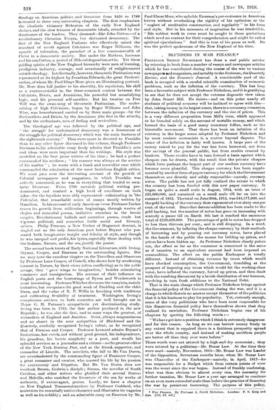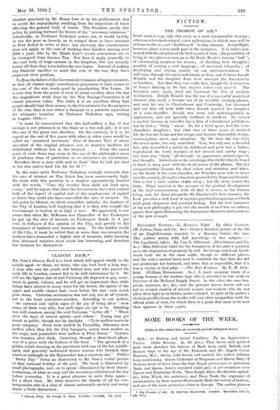BLUNDERS IN WAR FINANCE.*
PROFESSOR SHIELD Nienorsors has done a real public service by reissuing in book form a number of essays and newspaper articles which he has contributed during the course of the war to various newspapers and magazines, and notably to the Scotsman, the Quarterly Review, and the Economic Journal. A considerable part of the book is occupied with a careful scientific examination of economic problems, such as the inflation of the currency. This has long- been a favourite subject with Professor Nicholson, and it is gratifying to see that he does not accept the extreme dogmatic view taken by John Stuart Mill. He insists—and on this point nearly all students of political economy will be inclined to agree with him— that, taking money in its largest sense, there is a necessary connexion. between the inflation of the currency and the rise of prices. This is a very different proposition from Mill's view, which appeared to be founded solely on the amount of metallic money, and which formed the basis of a good many monetary follies, such as the bimetallic movement. That there has been an inflation of the currency in the larger sense adopted by Professor Nicholson and by most modern economists is a matter beyond dispute. The cause of the inflation is fairly well known. A large part of the money raised to pay for the war has been borrowed, not from the savings of the general public, but from credits created by bankers. These credits have in turn formed a basis against which cheques can be drawn, with the result that the private cheques which form perhaps the largest part of our modern currency have become more plentiful. This cheque currency has been supple- mented by another form of paper currency for which the Government themselves are directly and solely responsible—namely, currency notes. The public has not yet fully realized the extent to which the country has been flooded with this new paper currency. It began on quite- a small scale in August, 1914, with an issue of £21,000,000, and remained on a small scale till far on into the summer of 1915. The total on June30th, 1915, was £46,577,000, and the gold backing of the currency then represented over sixty-one per cent. of the total. Sincethat dateno addition has been made to the gold backing, but the number of notes has gone on increasing with scarcely a pause till on March 6th last it reached the enormous total of £220,689,000. The percentage of gold to notes has dropped to less than thirteen per cent., and is still dropping. In a word, the Government, by inflating the cheque currency by their methods of borrowing and by pouring out currency notes, have placed in the hands of the public the means for bidding up prices, and prices have been bidden up. As Professor Nicholson clearly points out, the effect so far as the consumer is conoerned is the same as if taxation to an equivalent amount had been imposed on commodities. The effect on the public Exchequer is totally different. Instead of obtaining revenue by taxes which would have checked consumption, the Government, trembling at the prospect of imposing any taxes which would hit the working-class voter, have inflated the currency, forced up prices, and th'en dealt with the resulting discontent by a lavish distribution of war bonuses, involving in turn fresh additions to the National Debt: That is the main charge which Professor Nicholson brings against the financial policy of the Government during the war, and it is a charge to which thereis no answer except theanswer of thepolitician. that it is his husinees to play for popularity. Yet, curiously enough, some of the very politicians who have been most responsible for this disastrous financial policy have themselves shown that they realized its unwisdom. Professor Nicholson begins one of his chapters by quoting the following words :- " We have got into a position which I think is extremely dangerous and for this reason. As long as we can borrow money freely to any extent that is required there is a fictitious prosperity spread over the whole country, and instead of making sacrifices people are better off than they ever were before."
These words were not uttered by a high-and-dry economist.; they were uttered by a politician—Mr. Boner Law. At the time they were used—namely, November, 1915—Mr. Boner Law was Leader of the Opposition. Seventeen months later, when Mr. Boner Law was Chancellor of the Exchequer—namely, in April, 1917—he was responsible for a Budget which from certain points of view was the worst since the war began. Instead of frankly confessing, what was then obvious to almost every one, the necessity for further taxation, Mr. Boner Law a year ago arranged to continue on an even moreextended scale than before the practice of financing the war by persistent borrowing. The purpose of this policy, • Was Finance, By Professor Z. Shield Nicholson. London-: S. King and Bon. [10s. 6d. net.; whether practised by Mr. Bonar Law or by his predecessors, was to avoid the unpopularity resulting from the imposition of taxes affecting the general body of voters. The Socialists justify this policy by putting forward the theory of the " necessary minimum." Admittedly, as Professor Nicholson points out, it would be folly to tax the poor so heavily as to compel them to have recourse to Poor Relief in order to live; but obviously this consideration does not apply to the case of working-class families earning over £200 a year, who by Mr. Boner Law's recent concessions are to be exempted from Income Tax. Nor does it apply generally to the vast body of wage-earners in the kingdom, who are actually better off than they were before the war began. Instead of making any financial sacrifice to meet the cost of the war, they have improved their position.,
Notiwas the failure of the Government to impose adequate taxation, so that all classes might contribute in proportion to their means to the cost of the war, made good by popularizing War Loans. It is true that from the point of view of social security after the war the magnificent work done by the War Savings Committee is of almost priceless value. But while it is an excellent thing that people should lend their money to the Government for the purposes of the war, that is not either a financial or a patriotic equivalent for adequate taxation. As Professor Nicholson says, writing in August, 1916: " It must be remembered that this half-million a day of war savings is not presented to the State as a free-will gift—it is not like one of the great war charities. On the contrary, it is to be repaid at the end of five years with what in other cases would be called an ' unearned increment' (free of Income Tax) of about one-third of the original advance, not to mention facilities for withdrawal without loss in the interval. . . . From the moral point of view there may seem to the eye of the philosopher more of prudence than of patriotism in so attractive an investment. ' Breathes there a man with soul so dead' that he will not lend to his own native land 15s. 6d. for £1 ? "
In the same spirit Professor Nicholson strongly contends that the rate of interest on War Loans has been unnecessarily high. He deals with this question in a chapter appropriately headed with the words, " Unto thy brother thou shalt not lend upon usury," and he argues that since the Government have had control both of the export of capital and of the employment of capital at home they could also have controlled the rate of interest. On this point he blames, we think somewhat unfairly, the bankers of the City of London, half implying that it is they who compel the Government to borrow at so high a rate. He apparently is not aware that when Mr. McKenna was Chancellor of the Exchequer he put up the rate of interest on Exchequer bonds to 6 per cent. in defiance of the opinion of the City, and greatly to the annoyance of bankers and business men. To the further credit of the City, it must be added that on more than one occasion the bankers have demanded a higher rate of taxation, while knowing that increased taxation must mean lees borrowing, and therefore less business for themselves.



























 Previous page
Previous page